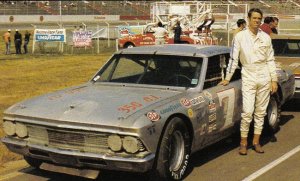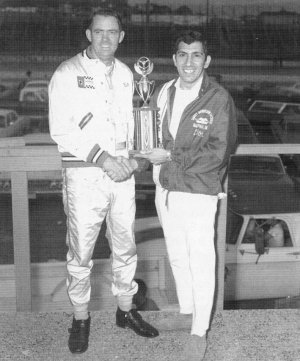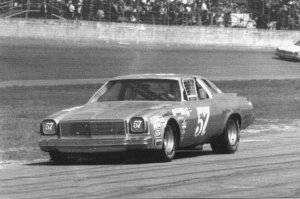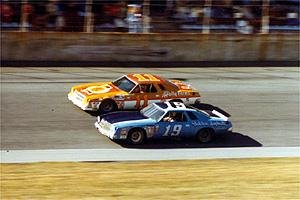GN Racing

Burcham and his Chevelle at Charlotte in the early '70s.
After running seven years or so in the NASCAR late model sportsman division, Bob decided to try his hand at Grand National racing. Even though NASCAR had already come up with the Winston Cup circuit, everyone still referred to the GN division of NASCAR.
“Jack White came up to me at Smoky Mountain Raceway and asked me if I would like to build a Grand National car,” Burcham said. “Of course, I told him that I sure would. The last racecar I would build would be a 1973 Chevelle and we went on the circuit for one year. Jack was from Rockwood, Tennessee and owned the car. He had a very successful machine company called Precision Specialty Machine in LaFollette, just north of Knoxville. It was his first and last GN car. He bought the Chevelle we ran at Smoky Mountain and we ran two or three races until the end of the 1973 season. Then we spent all winter building the Chevelle for GN racing.”

Burcham with Smokey Mountain Raceway promoter Don Namon. Namon left there and went on to operate Alabama International Motor Speedway (now Talladega Superspeedway), then the nearby International Motorsports Hall of Fame.
Several articles from the local newspaper give insight into how things went. Bob finished 13th at Daytona, 11th at Rockingham, eighth at Atlanta and 10th at Darlington in the early spring race there.
They won some $10,000 in the process, but this wasn’t enough for Bob. He was quoted as saying, “Everybody else thinks we’ve been running real good, but I’m not satisfied. My boys and I think we can do better. I want to win a super speedway race this year and I want to win the Rookie of the Year award.”
At that time racers were allowed two engines in GN racing – a big one with a small carburetor and a small one with a big carburetor. Bob and his partners ran with the big engine at first, but had some of the small engines by mid-season. Their biggest problem during the season was experience.

Burcham piloting Jack White's '73 Chevelle at Daytona. Bob Ran 20 Grand National races in '74, with one top five finish. "That's about as good as you can do, finish behind all the factory cars that are still around at the end." Bob finished 17th on this day.
“Daytona and Talladega are the only two tracks I had driven on before,” Burcham said. “Bobby Allison, David Pearson, Richard Petty and Cale Yarborough have raced on all of them dozens of times. When we get to each track, we’ve got to learn how to best set the car for that particular track. Experience is really the most important thing. And it costs a lot of money for that. The best I did with those Grand National deals was a fourth at Nashville. I couldn’t afford to run the big tracks, so I started driving for other folks.
“I drove for Henley Grey in my last race at Talladega in 1979. I drove Red Farmer’s Grand National ride when he went end-over-end in a Saturday race and broke his leg. I was running fifth when the rear end broke.”

Burcham (19) races against Cale Yarborough (11) in Henley Gray's Chevy at Daytona in 1977. Burcham would finish ninth, while Yarborough went on to win.
Bob Bearden of Dalton, the engine man on the team, remembered the last race the team ran at Dover.
“The engine blew and Bob backed it into the wall,” Bearden said. “This had happened two or three times in the six weeks prior to Dover. That was the last of four engines we had gotten from Waddell Wilson. On the plane ride back home, Jack White asked me what was next and I told him I was gonna go home and get working on the rest of my life.”
Burcham added, “You really had to have a factory ride to do anything. Even if you were a millionaire, who was going to sell the part to you? Certainly not factories with cars competing in the same race. And if they do sell you a part, it would have been obsolete by the time it reached your car.”
